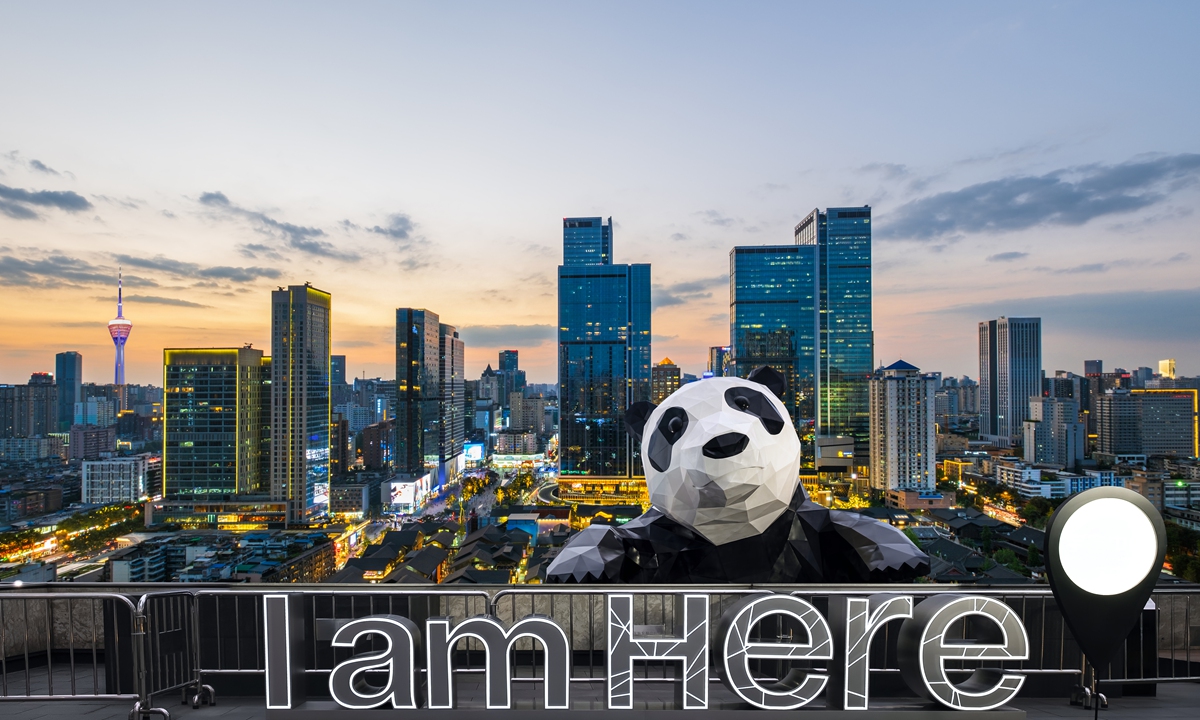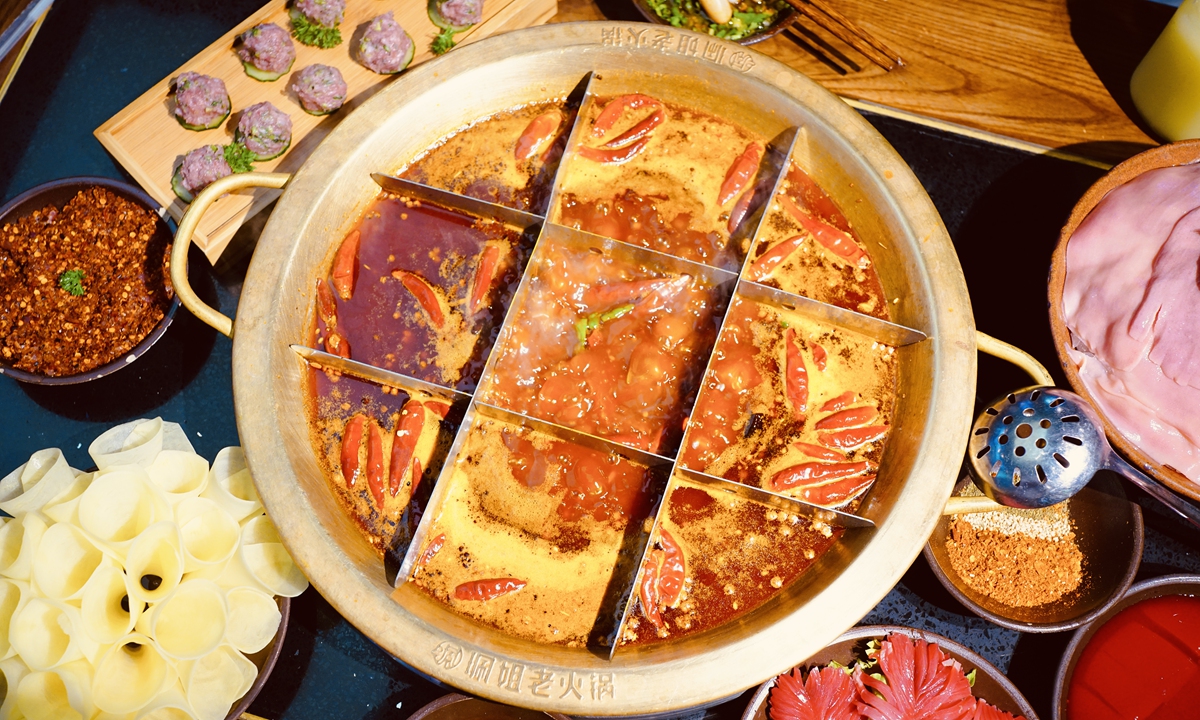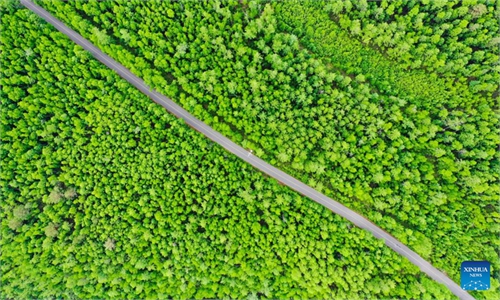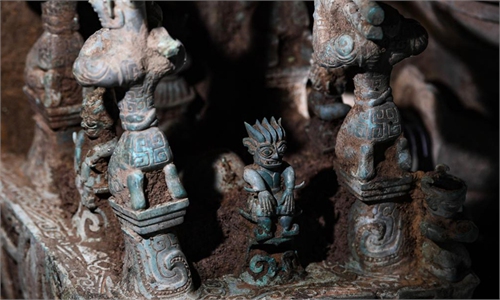ARTS / CULTURE & LEISURE
Chongqing, Chengdu’s shared yet distinct cultures
Tale of two cities

The cityscape of Chengdu Photo: VCG

Hong Ya Dong in Chongqing Photo: VCG

Chongqing-style hot pot Photo: VCG
Editor's Note:Southwest China's Sichuan Province and Chongqing Municipality are well-known around the world for their beautiful natural scenery and long-lasting cultural heritage and traditions.
Chinese President Xi Jinping on Wednesday inspected the city of Meishan in Sichuan. Here the Global Times will follow in the steps of China's top leader so that readers can appreciate the beauty of Sichuan and Chongqing and learn about the long history of the region's Bashu culture as well as its modern sites.
While the two cities of Chongqing and Chengdu, capital of Sichuan Province, share the same Bashu culture, differences in lifestyles, food, youth culture and urban renewal strategies have attracted visitors from around China and the world.
In 2021, the GDP of Chongqing and Chengdu ranked at 5th and 7th in China respectively due to local tourist booms created by impressive promotional campaigns that emphasize the local flavors that can only be found in the two cities.
Different personalities
Hong Ya Dong in Chongqing and Kuanzhai Alley in Chengdu are the two cities' most iconic urban scenic spots.
Hong Ya Dong, a landmark that shows the "Diaojiao building" aesthetics of Bayu traditional architecture, and Kuanzhai Alley, a commercial street with small lanes interweaving with each other among Qing Dynasty (1644-1911) buildings, have both become popular hot spots for local food and folk entertainment such as Sichuan Opera and the province's unique comic storytelling performances known as pingshu.
While Hong Ya Dong sits close to a river and Kuanzhai Alley is encapsulated in the city center, the two spots both exhibit the leisurely lifestyle of Bashu culture through the region's distinctive hot pot culture.
Mao Ding, a fan of Sichuan hot pot, explained to the Global Times that the beef tallow-based Chongqing hot pot with its heaping helpings of Sichuan pepper and the less spicy Chengdu hot pot with its more diverse side ingredients reflect the two cities' personalities.
"It is like the personalities of twin girls, both are quite sassy, but one is more direct and boyish, the other one is gentler," Mao emphasized.
According to Zhu Changping, a local cultural sociologist, the two cities' willingness to embrace local culture and lifestyles have made them more enticing to tourists. For instance, the Jiaotong teahouse in Chongqing, a public teahouse founded during the 1980s, has become a new cradle for the city's young rap culture.
Since 2017, when the city's famous rap brand GOSH published their teahouse cypher that brought Western music to their local neighborhood mahjong parlors, the creative combine has made these places used to be favored by older generations hot spots for young visitors to come and take photos that they later share on Chinese lifestyle platforms such as Little Red Book.
Chengdu local rap group Higher Brothers introduced Sichuan dialect rap to the world for the first time in 2017 with their rap video "Made in China," which became an internet sensation and earned more than 24 million views on YouTube.
Single strategy
Dubbed China's hot "cyberstar tourist cities," Chongqing and Chengdu share a single strategy: creating intriguing online topics related to its tourist spots as well as creating media productions full of local flavor to draw tourists' attention.
Yao Yu, a cultural creative industry expert, told the Global Times that Chongqing and Chengdu's "cultural experience" tourism strategy has helped make the cities' urban history relevant again.
Taking advantage of the city's industrial culture, once abandoned factories in Chongqing have been renovated into cultural creative parks such as TESTBED2 and Beicang, which are home to a library, exhibition hall, food center and bars that have attracted a large number of visitors.
Meanwhile, Chengdu's Dachuan Alley has embraced art, becoming China's first art district with an original gallery as its core. It has paved the way for the city's ambition to become China's new art hub. In 2021, the city hosted an art biennale, introducing the "Super Fusion" idea for the first time to attract visitors from around the world.
"Chongqing and Chengdu's development has been evolving alongside their passion to create global cultural experiences. Their cultural tourism is aimed at both domestic and global travelers," Zhu noted.



